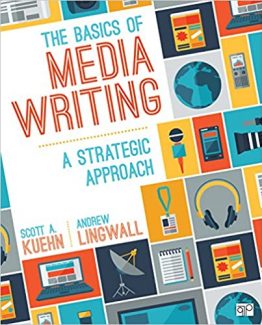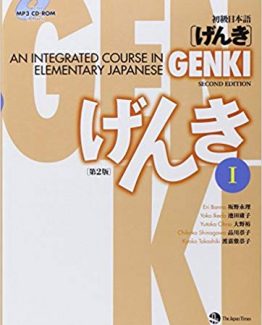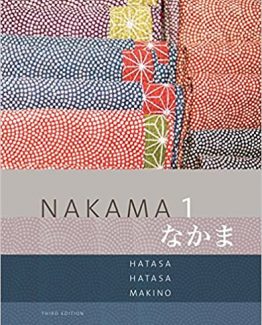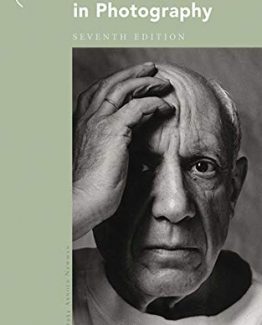English Grammar: A University Course 3rd Edition by Angela Downing, ISBN-13: 978-0415732680
[PDF eBook eTextbook]
- Publisher: Routledge; 3rd edition (December 9, 2014)
- Language: English
- 550 pages
- ISBN-10: 0415732689
- ISBN-13: 978-0415732680
This best-selling comprehensive descriptive grammar forms a complete course, ideal for all students studying English Language, whether on a course or for self-study. Broadly based on Hallidayan systemic-functional grammar but also drawing on cognitive linguistics and discourse analysis, English Grammar is accessible, avoiding overly theoretical or technical explanations.
Table of Contents:
Cover Page
Halftitle Page
Title Page
Copyright Page
Table of Contents
List of figures
Preface to the third edition
Acknowledgements
Introduction to the third edition
Table of notational symbols
1 Basic concepts
Unit 1 Language and meaning
Unit 2 Linguistic forms and syntactic functions
Unit 3 Negation and expansion
Exercises
2 The skeleton of the message: introduction to clause structure
Unit 4 Syntactic elements and structures of the clause
Unit 5 Subject and Predicator
Unit 6 Direct, Indirect and Prepositional Objects
Unit 7 Subject and Object Complements
Unit 8 Adjuncts
Further reading
Exercises
3 The development of the message: complementation of the verb
Introduction: Major complementation patterns and valency
Unit 9 Intransitive and copular patterns
Unit 10 Transitive patterns
Unit 11 Complementation by finite clauses
Unit 12 Complementation by non-finite clauses
Summary of major verb complementation patterns
Further reading
Exercises
4 Interaction between speaker and hearer: linking speech acts and grammar
Unit 13 Speech acts and clause types
Unit 14 The declarative and interrogative clause types
Unit 15 The exclamative and imperative clause types
Unit 16 Indirect speech acts, clause types and discourse functions
Unit 17 Questions, clause types and discourse functions
Unit 18 Directives: getting people to carry out actions
Further reading
Exercises
5 Conceptualising patterns of experience: processes, participants, circumstances
Unit 19 Conceptualising experiences expressed as situation types
Unit 20 Material processes of doing and happening
Unit 21 Causative processes
Unit 22 Processes of transfer
Unit 23 Conceptualising what we think, perceive and feel
Unit 24 Relational processes of being and becoming
Unit 25 Processes of saying, behaving and existing
Unit 26 Expressing attendant circumstances
Unit 27 Conceptualising experiences from a different angle: Nominalisation and grammatical metaphor
Further reading
Exercises
6 Organising the message: thematic and information structures of the clause
Unit 28 Theme: the point of departure of the message
Unit 29 The distribution and focus of information
Unit 30 The interplay of Theme–Rheme and Given–New
Further reading
Exercises
7 Combining clauses into sentences
Unit 31 Clause combining: the complex sentence
Unit 32 Relationships of equivalence between clauses
Unit 33 Relationships of non-equivalence between clauses
Unit 34 Subordination and subordinators
Unit 35 Discourse functions of conjunctions
Unit 36 Reporting speech and thought
Further reading
Exercises
8 Talking about events: the Verbal Group
Unit 37 Expressing our experience of events
Unit 38 Basic structures of the Verbal Group
Unit 39 Organising our experience of events
Unit 40 The semantics of phrasal verbs
Further reading
Exercises
9 Viewpoints on events: tense, aspect and modality
Unit 41 Expressing location in time through the verb: tense
Unit 42 Past events and present time connected: Present Perfect and Past Perfect
Unit 43 Situation types and the Progressive aspect
Unit 44 Expressing attitudes towards the event: modality
Further reading
Exercises
10 Talking about people and things: the Nominal Group
Unit 45 Expressing our experience of people and things
Unit 46 Referring to people and things as definite, indefinite, generic
Unit 47 Selecting and particularising the referent: the determiner
Unit 48 Describing and classifying the referent: the pre-modifier
Unit 49 Identifying and elaborating the referent: the post-modifier
Unit 50 Noun complement clauses
Further reading
Exercises
11 Describing persons, things and circumstances: adjectival and adverbial groups
Unit 51 Adjectives and the adjectival group
Unit 52 Degrees of comparison and intensification
Unit 53 Complementation of the adjective
Unit 54 Adverbs and the adverbial group
Unit 55 Syntactic functions of adverbs and adverbial groups
Unit 56 Modification and complementation in the adverbial group
Further reading
Exercises
12 Spatial, temporal and other relationships: the Prepositional Phrase
Unit 57 Prepositions and the Prepositional Phrase
Unit 58 Syntactic functions of the Prepositional Phrase
Unit 59 Semantic features of the Prepositional Phrase
Further reading
Exercises
Answer Key
Select Bibliography
Index
Angela Downing is Professor Emeritus at Universidad Complutense de Madrid, Spain. She was General Editor of Atlantis (Journal of the Spanish Association of English and American Studies) from 2006 to 2012 and has published numerous articles on grammar and discourse.
What makes us different?
• Instant Download
• Always Competitive Pricing
• 100% Privacy
• FREE Sample Available
• 24-7 LIVE Customer Support






Reviews
There are no reviews yet.